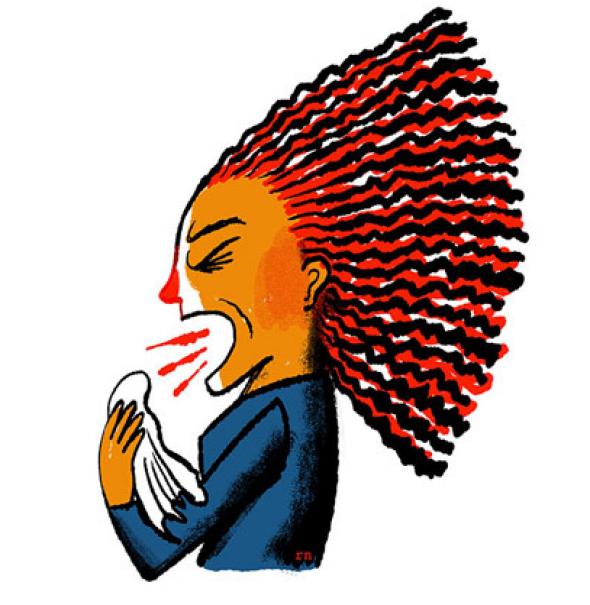Browse the cold and flu aisle at the pharmacy or watch certain famous doctors on TV, and you’ll encounter a number of products claiming to boost your immunity, “naturally.” Research on these products shows that they are expensive placebos. However, many people remain convinced that these potions can keep them healthy. Millions of people are taken in by the seemingly friendly—but ultimately cynical—marketing of these products, and they happily fork over their money for what overwhelmingly amounts to snake oil. For all you believers (and for skeptics looking for some new arguments), consider this: Boosting your immunity is actually a pretty bad idea. Even if these remedy and prevention products did what they purport to, you wouldn’t want them to.
We have two complementary immune systems: innate and acquired. Innate immunity is the body’s natural, knee-jerk reaction to an unknown infection. Innate immunity is fast, broad, and incredibly nonspecific. When it gets activated, you know the feeling all too well—fever, cough, runny nose, and body aches. In short: inflammation. You can already see why you might not want to “boost” this part of the immune system.
Like it or not, as soon as a virus enters your body, innate immunity kicks in. And when it does, the symptoms are pretty similar, regardless of which of the several hundred typical cold viruses it happens to be. Before your body has determined the precise identity of the new invader, your innate immunity mounts a fever to try to cook the microbes and produces cough and phlegm to try to flush those critters out. These haphazard responses are mildly helpful, supremely annoying, but—and this is crucial—are not what actually defeats an infection.
The real work of neutralizing an infection is the purview of acquired immunity, the targeted branch of your immunologic military that is built up over your lifetime. The acquired immune system contains B and T cells that produce and interact with proteins called antibodies that can attack an unbelievable number of specific infections. While a small percentage of antibodies are passed from mother to child, the majority are produced when a person first encounters a particular infection. The resulting antibodies are analogous to weapon caches our bodies keep in storage for decades in the event of a future invasion: It’s the ultimate Cold War. If the body has been previously exposed to an infectious pathogen (or vaccinated against it), the acquired immune system “remembers” it and is able to quickly recognize it in the event of future reinfection. Once reactivated, the acquired immune system synthesizes only the correct antibodies, with astonishing precision and efficiency. Most common and mild viruses are cleared quite trivially in this way, usually within days. It is evolution at its finest. New viruses are dealt with in a similar way. The only difference is that the immune system has no memory of novel viruses, so it takes longer to produce just the right antibodies.
Meanwhile, the innate immune system rages on for much longer than necessary. While the acquired immune system’s antibodies have already fought and won the real battle, the innate branch just doesn’t get the communiqué, so it fights on unwittingly. As we all know, coughs and runny noses can linger for weeks, even after the mildest of viral infections.
This is why boosting your immunity seems like such a bad idea. Over-the-counter alternative-remedy products can’t boost your acquired immunity. Even magical thinkers would have to acknowledge that the only way to do that is through vaccination—something that too many alternative-remedy users seem to shun—or a bone marrow transplant, a dangerous but often necessary treatment in certain blood cancers that also increases immune system cells. That leaves innate immunity as the only target of these over-the-counter remedies that claim to enhance your natural immunity. But who would actually want that? Last I checked, no one wants fever or a runny nose.
The mainstay of treatment for symptomatic cold viruses is to suppress, not boost, our crude and clunky innate immune responses. That’s why we take fever reducers and antihistamines. Even if a natural immunity boost were possible, the very notion of this is misguided. In extreme cases, overreacting to infections can even cause changes in our vascular system, leading to sepsis and shock—our blood vessels become too flimsy in response to inflammation initiated by, you guessed it, our natural innate immune responses.
In general, extremes are bad. Too much immunity (for example, autoimmune responses) can lead to allergies, tissue damage, and even anaphylaxis. Too little immunity, say from chemotherapy or HIV/AIDS, and you’re at risk of deadly infections that most people clear with ease. Our bodies have evolved toward a balance, but sometimes innate immunity is overzealous and needs curbing.
So, the next time you feel a cold coming on, maybe what you really want is just a little teensy bit of innate immune suppression, not an immunity boost. Over-the-counter medications like ibuprofen and antihistamines should help you feel better. Meanwhile, sit back while your acquired B and T cells do the rest. And if you aren’t yet sick, stay up-to-date on your vaccines, including the yearly influenza vaccine. Most importantly, practice vigorous hand washing—after all, the skin is also a component of your natural defenses and one that actually can be enhanced by good hygiene. Take care of yourself by keeping a balanced diet, maintaining good sleep habits, and minimizing stress. These are interventions that have been shown to help keep your immune system at its best. These alone can “boost” your odds of staving off an infection this cold season.
Disclaimer: The opinions expressed in this article are solely those of the author and do not reflect the views and opinions of Brigham and Women’s Hospital.
